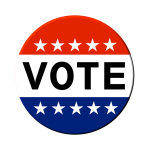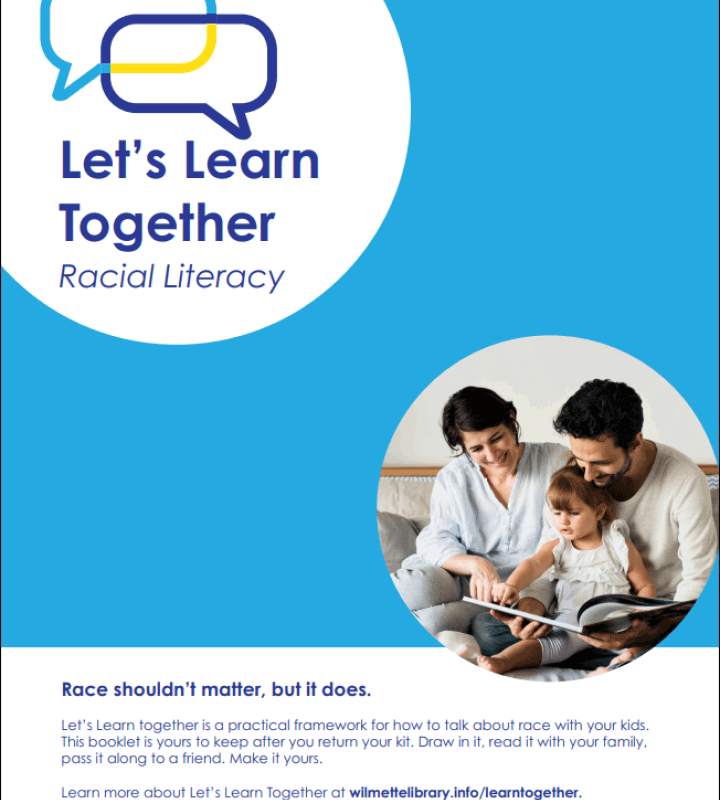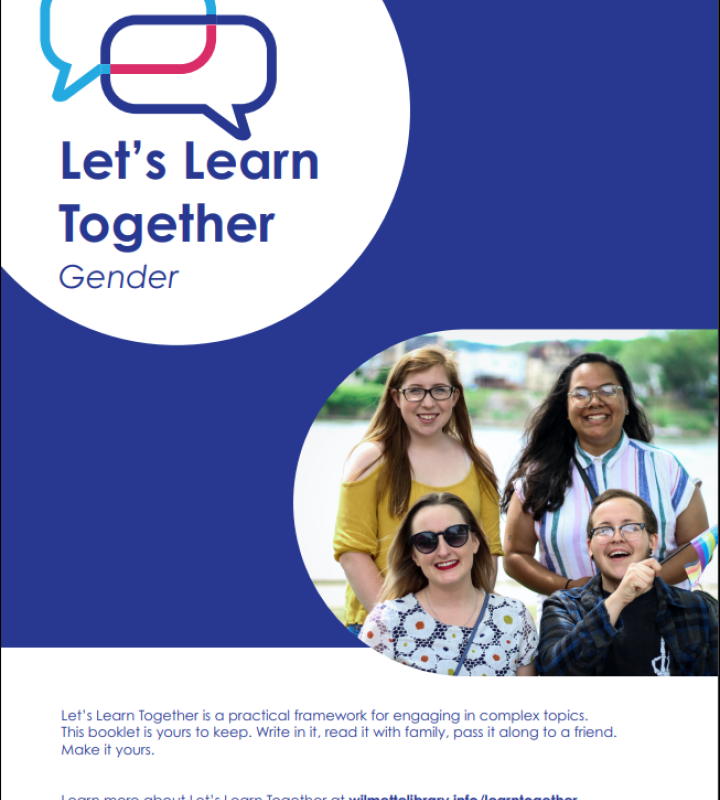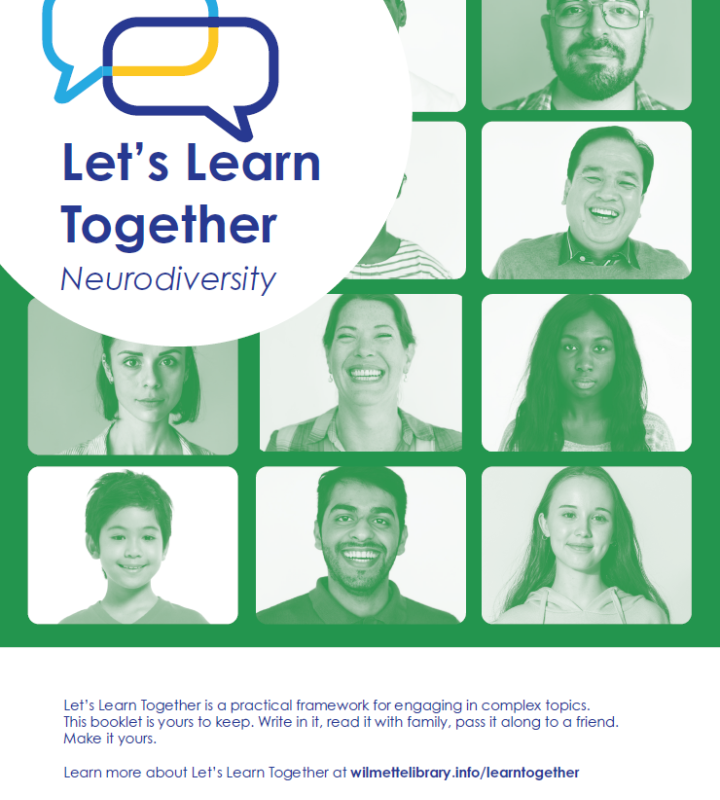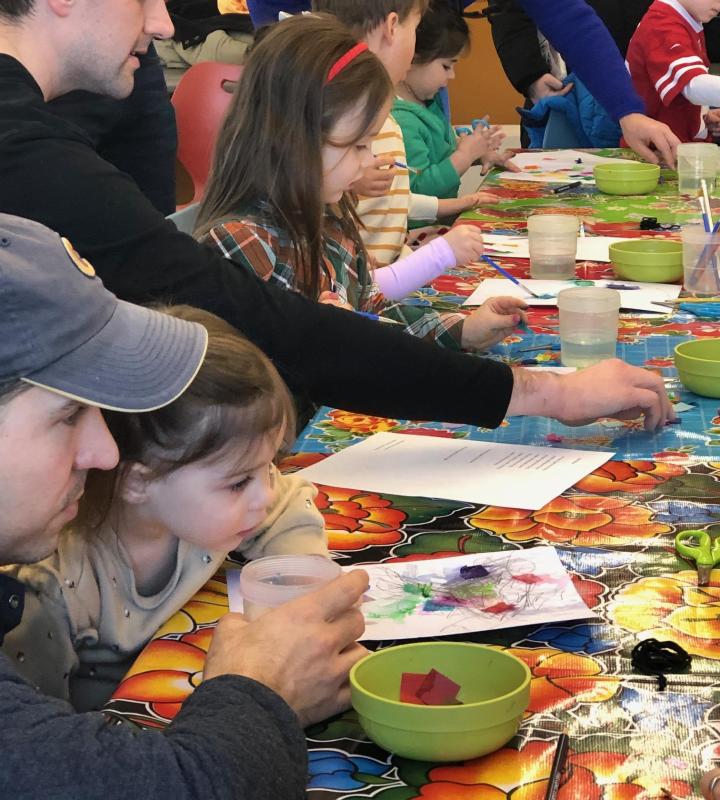Library Resources
Each year, Let’s Learn Together takes an in-depth look at specific topics relevant to our society.
In 2023, we explored racial literacy, and in 2024, we focused on gender. In 2025, we celebrate neurodiversity. The library offers programming, literature, and free informational booklets on these topics.
In Youth Services, patrons can browse special collections of kids and parent/teacher books dedicated to Let’s Learn Together topics.
Outreach Programs
Many Let’s Learn Together programs are offered as outreach. Please contact the library if you are interested in hosting one of these free programs at your school, church, parenting group, or other organization in Wilmette or Kenilworth.
Using Picture Books to Talk About...
Picture books create space for talking about complex topics with children of all ages. Librarians will recommend the best books for various topics and model how to create an affirming environment for meaningful conversations. Topics include feelings, mental wellness, memory loss, community violence, immigration, and more.
Racial Literacy in the Preschool Classroom
Incorporating conversations about race into the early childhood classroom gives children agency in exploring and embracing diversity in our society. Pairing diverse books with prompts and activities encourages young children to explore self and group identity, and develop kindness and empathy. In this interactive workshop, librarians will share diverse picture books, play-based activities and music for developing racial literacy in the preschool classroom.
Gender Literacy in the Preschool Classroom
Whether you are supporting a specific child or building an anti-bias curriculum, this workshop will introduce you to developmentally appropriate books on expression and identity, and provide language and talking points. Workshops are contoured to your needs and questions.
Neurodiversity in the Preschool Classroom
Learn about tools, strategies, and literacy to create a neurodivergent affirming classroom and curriculum. We'll recommend books for children, teachers, and caregivers and share how the library embraces neurodiversity in programs and spaces.
Racial Literacy in the Preschool Classroom
The kit includes books, felt activities, printables, and music to support an inclusive classroom and help children explore the properties and qualities of racial differences and build on their natural sense of fairness and justice. Kits are available for check out on school accounts.
Gender Literacy in the Preschool Classroom
The kit includes picture books and educator guides to support a safe and inclusive classroom. Whether you are supporting a child's identity or building an anti-bias curriculum, this starter kit will provide inspiration. Kits are available for check out on school accounts.
Neurodiversity in the Preschool Classroom
The kit includes books and tools that support a neurodiverse affirming classroom. You can experiment with using sensory tools and choice boards to help children regulate, and try out an audiobook as an alternative way to engage with literacy. This kit includes picture books, sensory tools, a choice board, and an audiobook Playaway.

Library Programs
Let’s Learn Together programs respond to current social issues and complex topics. They are curated for adults, parents and educators, and families with children.
In addition to one-off events, we offer the following ongoing series.
At this interactive story hour for the whole family, we’ll engage with meaningful topics through stories, music and art.
Reading and playing together with children creates an affirming space where we can be curious, explore ideas, and ask questions. The coziness of reading together actually releases serotonin, which helps solidify the language and learning that occurs during this experience. Doing activities together as a family brings meaning to concepts like kindness, empathy, gratitude and equity.
Open Books, Open Minds introduces families to books, music and activities that build community and help us talk about and engage with the world we live in. The program is ideal for families with young children, and fun for everyone!

Between the Lines is a series of parent education programs in collaboration with D39 PTAs and PTOs. Topics respond to the interests and challenges of parents and caregivers, and have included civic engagement, LGBTQIA+ advocacy, leaning into differences, and neurodiversity.

Art for Big Feelings is a K-2 program that helps children organize complex feelings and relieve stress through stories and art activities. The program begins with a story that addresses a social emotional concept or a challenging situation. We spend a few minutes talking about the story, then we turn on some music and make art. The activities are process based and the children enjoy exploring and experimenting with various materials. We use a visual schedule, keep the lights low, and offer sensory tools and noise cancelling headphones.

This program is designed for parents and children to learn more about neurodiversity while enjoying story time and collaborative crafts. During storytime, your child will enjoy an interactive and engaging environment tailored to support communication development. Afterward, the SLPs will be available to answer your questions about speech services and how they can help your child's unique needs. This is a welcoming space to connect with other families, learn about speech and language strategies, and explore ways to support your child’s growth in communication.


